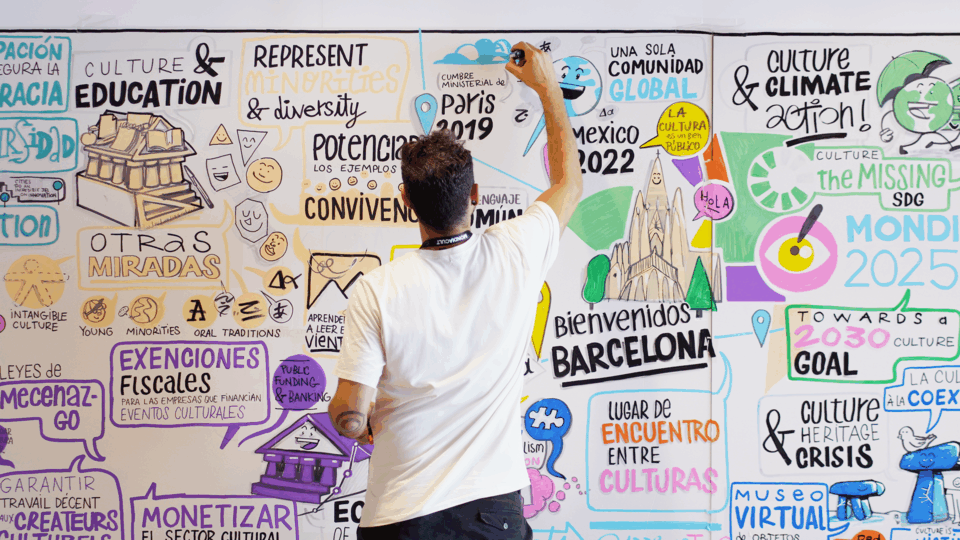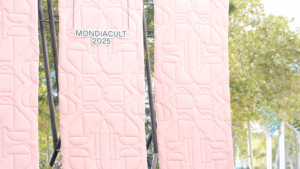- Posted on October 7th, 2025
Meaningful Action on Culture and Climate at MONDIACULT 2025

In Barcelona last week, global cultural leaders came together for MONDIACULT – UNESCO’s cultural policy summit – to explore how culture can drive social and environmental transformation.
Several members of the JB team were there, including Graciela Melitsko Thornton, Alison Tickell, and Thiago Jesus. Over the course of the conference, they joined cultural activists, leaders and policymakers in a growing international movement to place culture at the heart of climate action.
In this blog we dive into the MONDIACULT world, what happened, what it means for culture in climate action, and what comes next ahead of COP30 in November.
MONDIACULT, the big UNESCO moment for international culture policy-makers to come together and reflect on global trends, took place last week in Barcelona. Held every four years, the conference brings together all 194 UNESCO Member States to shape a global agenda for culture. This year’s conference was hosted by the Government of Spain in Barcelona, the heart of Catalan culture.
The global context was everywhere: conflict, genocide, rights, disruptive AI and climate change. Conversations about culture as peace-builder, defender of cultural and human rights, protector of land and nature even whilst acknowledging that culture is, and always has been weaponised, returned again and again. This culminated in a final, wonderful concert for Peace conducted by Jordi Savall, musicians from war-torn regions performing for over two hours, upholding our shared and common humanity.
As the world faces multiple complex and interconnected crises, culture that builds community, resilience and new imaginaries is more necessary than ever.
At JB we define culture as cultural heritage, arts and the creative industries. These reflect the places, practices, experiences that people care for, as well as values and ideas that shape our world. Culture-based solutions focus on how cultural and creative industries, traditional knowledge systems and local heritage contribute to climate solutions. Up until very recently, culture’s been largely sidelined in climate policy frameworks, too often viewed as a ‘nice-to-have’, with the focus instead on technological or scientific solutions.
Culture-based approaches can help reframe how we understand and respond to the climate crisis, shifting mindsets and reimagining futures, whilst also supporting mitigation, adaptation and resilience efforts. Unlike many siloed policy interventions, cultural approaches cut across rigid sectoral boundaries.
Crucially, they acknowledge the interlinked nature of today’s crises, aiming to address root causes rather than symptoms. In his opening speech at the conference, the Prime Minister of Spain highlighted the connections between the ongoing genocide in Gaza, the destruction of cultural heritage and natural heritage in Ukraine, and the broader severing of people from place and environment. Many of the same forces behind environmental destruction are also complicit in violence and cultural erasure.
JB’s main contribution to MONDIACULT and COP30 is an international campaign we are convening with CHN, Entertainment and Culture, Europa Nostra, Petra National Trust, People’s Palace Projects, The Convergence and others. We Make Tomorrow is a global campaign to have culture fully integrated into the second Global Stocktake – the UNFCCC five-year mechanism for assessing progress towards meeting international targets. The heart of the campaign is a Global Call, signed by individuals, organisations and networks united in climate action. Since launching a few weeks ago, it has already gathered 600 signatures representing over 100,000 people.
Why does this matter? Because the Global Stocktake commitments are made up of national commitments – Nationally Determined Contributions (NDCs). Without culture baked in to our climate strategies we will continue to fail, of that I am certain. You can sign the Global Call.
Given how little attention culture-based solutions have received in international climate spaces to date, this year’s conference marked a huge step forward.
Before the conference even started, the Third High Level Ministerial for the Group of Friends of Culture-based Climate Action was held, which set an incredible tone for everything that followed.
The group – over 50 Ministers of Culture and 23 Knowledge Partners (including JB) is led by Ministers of Culture Margareth Menezes (Brazil) and Sheikh Salem bin Khalid Al Qassimi (UAE) with Special Envoy Princess Dana Firas of Jordan and Youth Climate Champion Marcele Oliveira. One by one, ministers stated their commitments to culture based climate action.
Inspiring, holistic, and urgent, Ministers elevated culture as the missing link to climate action, expressed their commitments, and contextualised climate and culture within their own countries.
The contributions particularly from Colombia, Brazil, Costa Rica and Mexico, all of which have strong Indigenous communities and cultures, were way ahead: holistic in cultural definitions, ethical in sentiment and ambitious in scope.
Ministers unanimously adopted the Barcelona Declaration, a statement which reaffirms commitment to embedding culture in climate action at both national and international levels.
UNESCO also used the Group of Friends meeting to launch a terrific new thematic paper, Culture and climate action: from margins to mainstream, which makes the case emphatically for culture at the heart of climate action.
Despite membership of the Group of Friends from UK based organisations – JB and British Council – the UK does not have Ministerial membership; this absence, in spite of many in the UK’s creative and cultural community elevating climate in their work, is heart-breaking. However, with the PM recently suggesting that he may not attend the main COP30 talks, the UK’s political commitment to global climate multilateralism more broadly remains uncertain.
There were strong calls at this year’s conference for culture to be included as a standalone goal in the post-2030 development agenda. UNESCO launched its first Global Report on Cultural Policies – Culture: The Missing SDG, a comprehensive overview of cultural policies and evidence. Thiago Jesus, one of the CCL team and People’s Palace Projects Climate lead authored the chapter on culture and sustainability – it’s a great read!
Summing up at the final plenary, Latvia’s Minister of Culture Agnese Lace gave a powerful overview of why this matters.
A key message was the continued lack of integration of culture – especially heritage – in climate strategies, risk assessments and adaptation frameworks, and recognition that cultural dimensions remain sidelined. Delegates also recognised the important role of artists in inspiring behavioural change and shaping public imagination.
While safeguarding cultural heritage – both intangible and tangible – remains an utmost priority, another theme was the need to understand cultural heritage and culture more broadly as an active force. For example, integrating Indigenous knowledge with more traditional scientific approaches challenges the dominant models of authority underpinning many UNFCCC processes. This leads to forms of action which are better suited to local contexts, more inclusive and grounded in relationships with the land, water, and other living beings. Small Island Developing States (SIDS) were highlighted by Lace as communities that, whilst vulnerable to cultural loss, also offer powerful culture-based solutions.
Delegations called for scaling up investment and capacity building, knowledge sharing and data collection to ensure that culture is fully recognised and resourced in the global climate response.

Looking ahead to COP30
MONDIACULT was a critical moment to showcase leadership and build a strong global coalition on climate. Despite this momentum, we’re still a long way off from culture being fully recognised or resourced in international climate policy. Culture is clearly thinking about climate, but it’s less clear how seriously the climate world is taking culture.
There are reasons to be hopeful. With COP30 in just a few weeks the Brazilian presidency has been vocal in its support for culture, with the first ever Culture Day at COP, the Global Mutirão a perfect vehicle for culture, including We Make Tomorrow. Whether this signals lasting change remains to be seen. There’s a lot of talk, but will it translate into action? After Mondiacult it feels possible.
As Spain’s Minister of Culture said at the close of the conference:
“[this Conference] has been much more than a forum for dialogue: it has been a collective affirmation of principles. Because to defend culture today is to choose cooperation when others opt for withdrawal; it is to embrace diversity in the face of those who seek to standardise thinking; it is, in short, to renew the founding spirit of the international community, which recognised culture as a universal right and an indispensable condition for peace”.
Sign the Global Call
Photos by Yusef Yarmohamed.
